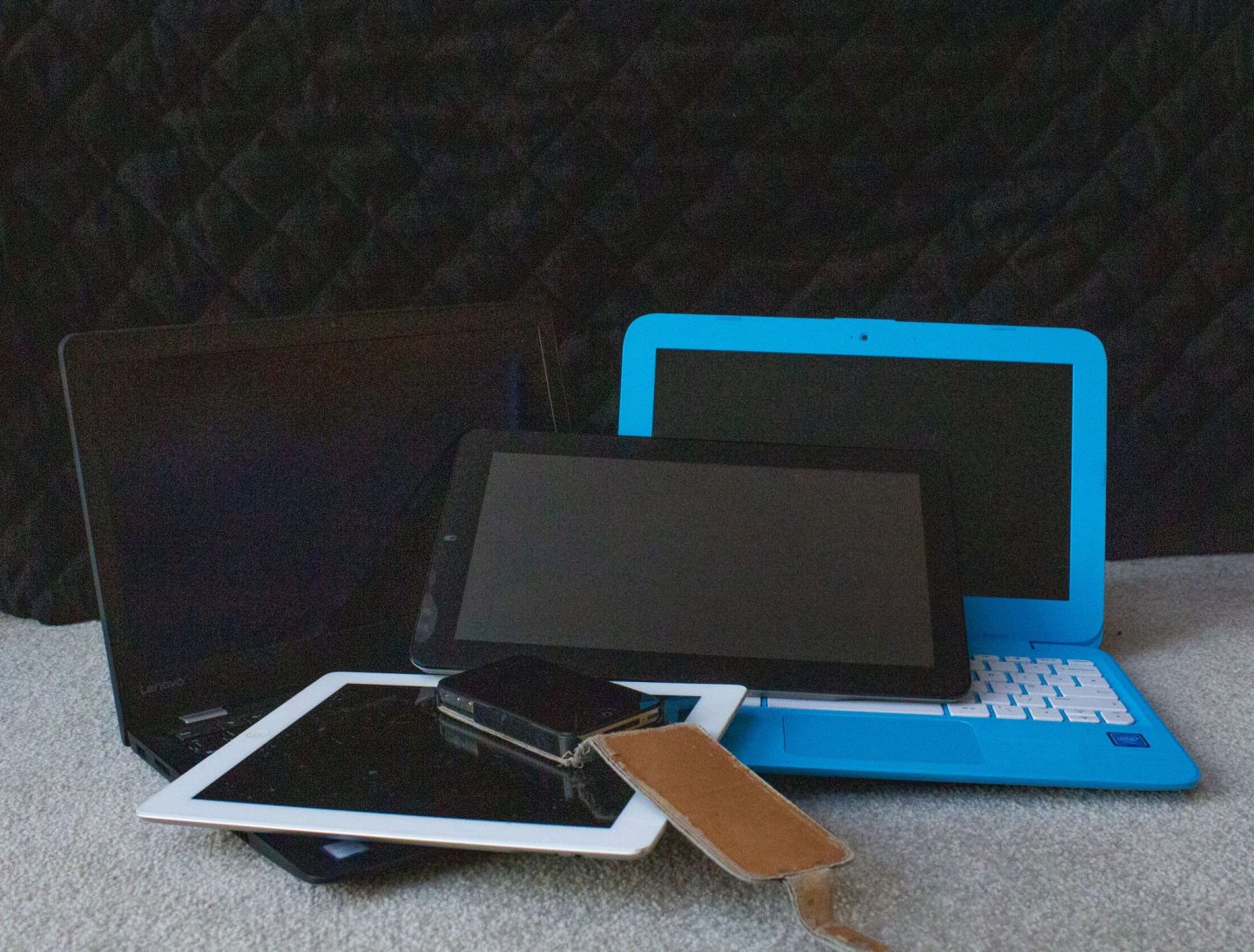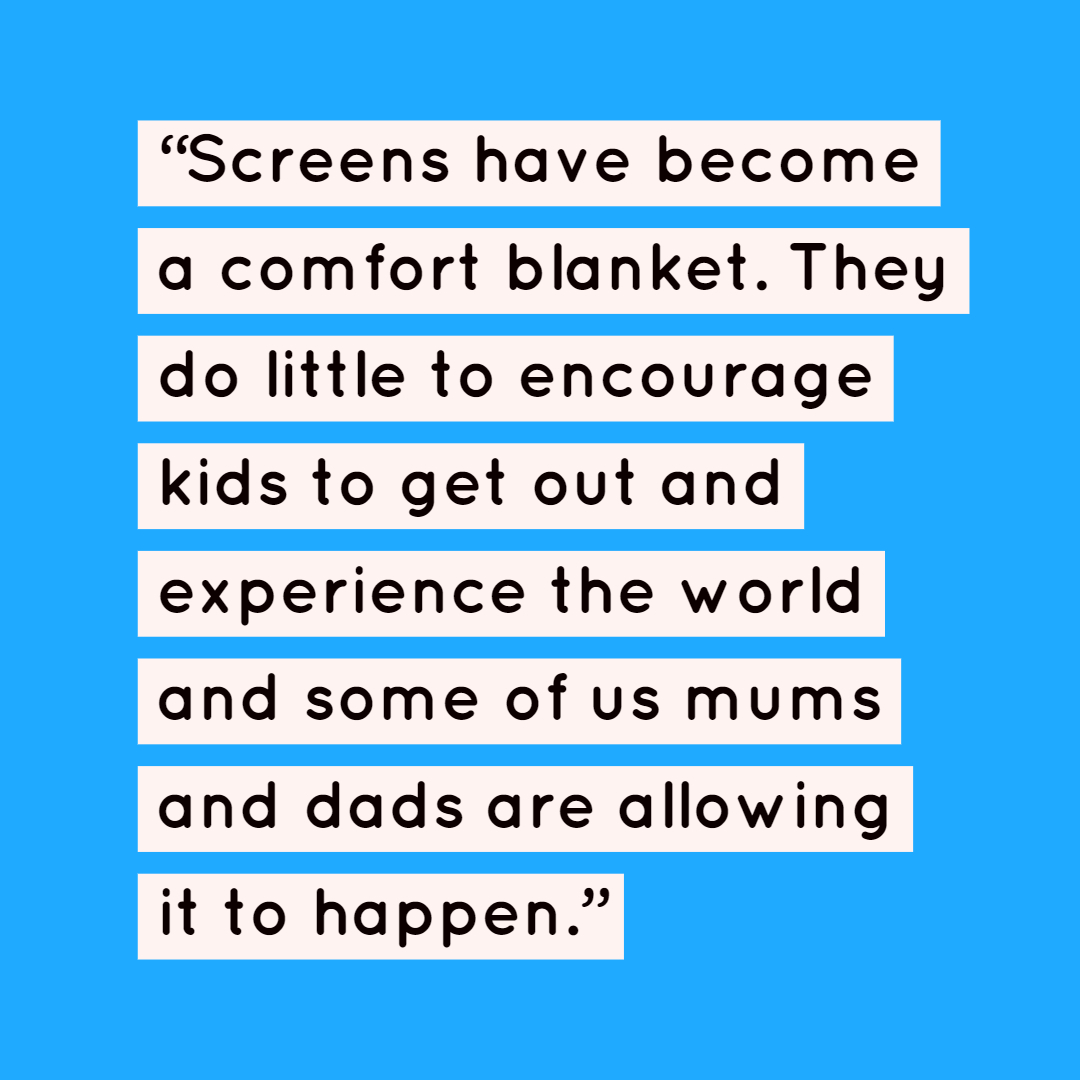Just as the Christmas holidays have ended and children have gone back to school, The Royal College of Paediatrics and Child Health (RCPCH) has produced guidance saying screen time for kids may not be as bad as we all thought. I’m sure many parents would have preferred this guidance to have come out before the recent holidays because, well, you know, screen time rules get a bit flexible during holiday periods, don’t they?

The guidance itself seems very sensible but the resulting news headlines give out completely the wrong message. Worry less about children’s screen use, says the BBC. Screen time not intrinsically bad for children says the Guardian and No direct evidence screen time is bad for kids, says Sky News.
All things considered, the guidance seems quite sensible, but I think it ignores the social impact on children, something I notice more and more as my kids get older.
Screen time, I feel, is the parenting battle of the 21st Century. We all use tech. No matter our age, tech is heavily embedded in our lives and there’s no point denying it. For that reason, I think kids need access to tech, but it needs to be managed.
The RCPCH has basically said that screen time should not replace healthy activities or time with family. It’s also said that screens should not be used in the hour before bed because of hard evidence it has a detrimental effect on sleep.
Personally, I think screens have had a massive impact on childhood. It’s a social impact and one that makes me feel very sad.
I was fortunate as a child. Living in a rural location, my upbringing was a bit more Swallows and Amazons than most. I was allowed on cycle roads and I would, from about the age of 10, walk the four miles to my grandparent’s house every Sunday to deliver their Sunday papers.
Now I have my own family and we live more of a suburban life. We could never replicate the upbringing I had, but I never see kids outside without a parent or carer a few paces away from them.
When my eldest child has friends round to play, they often arrive with a tablet or smart phone. I know kids play together on tech and it can be sociable, but doesn’t this defeat the object of having a play date? Shouldn’t they play with each other, not devices?

The other fear I have is of being labelled “that” family. Helen, our eldest child is nearly 10 years old. It’s not that long until she will be catching a bus to secondary school every day. Mrs Adams and I need to know she has the skills to make such a journey on her own.
I would personally have no issue with her playing outside with other kids on the green that’s metres away from our house. From time to time she has been allowed to go to a nearby shop, an incredibly short walk that involves crossing one very quiet residential street.
The fact is, children never play on that green, certainly not without an adult being present. As for allowing our child to go to a local shop, the reaction from other parents with kids of a similar age has been one of horror when I say she’s been allowed to do this.
Kids are not allowed out. They spend a huge amount of time using screens and parents, I think, are frightened to give them freedom out of the family home. Although I want to give my daughter more freedom, I don’t because I’ve seen how other parents react when I suggest it. I worry my kids would be sidelined simply because their parents allow them to play a few metres outside of the family home (and we really are talking metres).
Screens are safe, screens keep kids close to home. If kids are using screens to play games such as Just Dance or using a Wii Fit, screens can even keep them fit and active.
What screens don’t do, is give kids the skills to socialise and keep themselves safe out of the house. They don’t give kids the skills to deal with friendship fallouts, how to play independently or give them the confidence to spend time away from their parents.
This, I think, is the real issue about screen time. Yes, there are links with obesity, depression and self-esteem. The biggest worry for me is that screens have become a comfort blanket. They do little to encourage kids to get out and experience the world and some of us mums and dads are allowing it to happen.
Do you have an opinion on this? Do you think screen time does pose a real risk to children developing social skills or are you fine with it?







5 thoughts on “The real risks posed by too much screen time”
Great post, John. My son is still a bit too young to have “tech” playdates, but I’m definitely not looking forward to them when they arrive. I completely agree that British kids don’t spend anywhere near enough time outside (I believe the stat is “less time that prison inmates”), and when the time comes, I will be doing everything I can to ensure my son embraces the outdoors more than his iPad. I’m sure it will be tough though.
Less than an hour a day I think it is Stuart. When you consider they get that at school, it gives you an idea how bad the problem is for some kids. Good luck dealing with those play dates when they come.
For me, it’s a little from column A and a little from column B – but I agree we shouldn’t just allow our kids to use screens without some kind of limit or thought. It’s not so much about how many hours our kids spend on screens but what matters is (a) the quality of the time they spend on screens (e.g. if they’re researching a school project) and (b) what they do with their non-screen time.
Also, does screen time have a noticeable impact on behaviour? We have seen repeatedly that on days/weeks when we allow the kids to veg in front of the TV or the Xbox, their behaviour and ability to occupy themselves without screens deteriorates. (“Dad, I don’t know what to do now …”)
We don’t always get the balance right but we’re fortunate in that all our kids have regular activities that get them out of the house at least a couple of times a week. And they often play outside with our neighbours’ kids. In fact, we were just talking last night about introducing a regular ‘reading hour’ (or half hour, or whatever) on Sunday afternoons instead of always having a ‘film night’.
You absolutely need a balance Tim. I mean come on, how much time do us mums and ads spend looking at our phones? As I point out to my family, I am often working when I am looking at my phone but they don’t get it.
That’s a great point you make Tim about kids playing idependently. One of our kids does that a lot, another doesn’t. And we absolutely do not allow screens after 7pm. Too close to bed time.
Striking that balance, that’s the awkward thing. Tell me when you find an answer!
After reading the “Royal College of Pediatrics and Children’s Health guide” and “The health impacts of screen time – a guide for clinicians and parents” I offer my reflection and concerns anticipating discernment and a collegial discussion to benefit all those effected by recreational streaming media. It seems to me there is substantial evidence that screen time can be harmful to a child’s health and development.
a) There are numerous studies that correlate interactive screen time, especially in MMORPG (Massive Multiplayer Online Role-Playing games) and aggressive, often antisocial developmental outcome for users of personal recreational technology.
b) The “Key Messages” introduction states the “evidence base for a direct ‘toxic’ effect of screen time is contested, and the evidence of harm is often overstated.” One could easily discover the majority of disagreement comes from the consumer/producer group, who tend to minimalize effects of the recreational technology they sell. Academic and professional psychology groups consistently find negative associations with recreational, interactive technology and general behavior in those studied. It’s important to know that exposure to violent media by researchers affecting children is generally avoided due to ethical issues involving research.
c) The “Key Messages” introduction incorrectly represents the “majority of the literature” since there is significant research evaluating multiple aspects of recreational screen use, not just “only at television screen time”.
d) A “specific intervention (that) can be applied across the population to reduce screen time” is parental intervention and awareness of what exactly children are experiencing with their small screens. One intervention is a use history which the parents and child would review on a weekly basis, however the state of the art in personal technology provides a motivated user means to circumvent such interventions if reasonably motivated to do so.
e) To develop “The health impacts of screen time – a guide for clinicians and parents, the “Health Policy Team” consulted 109 children and young people from across the UK, aged 11-24 years”. We should all wonder why the authors did not interview academic and psychological professionals as well. As the author of “Virtual Immersion Drown Holistic Development (2015) I consistently seek to maintain a current understanding of the state of research. It’s interesting the authors did not consider the APA Task Force on Violent Media (2015) review of violent video game literature ( http://www.apa.org/pi/families/violent-media.aspx) or other resources freely available. I would have to believe the cohort consulted would support the thesis of “no problems with screen use” since this age group has the highest time and social investment in screens as a primary form of entertainment and socialization.
f) “The health impacts of screen time: a guide for clinicians and parents” did acknowledge “Children with higher screen time over 2 hours a day tend to have a less healthy diet, a higher energy intake, and more pronounced indicators of obesity, depressive symptoms, poorer educational outcomes, sleep and physical fitness” (pg3). The guide affirmed existing research citing a consistent lack of “consistent evidence for any specific health or wellbeing benefits of screen time”.(Pg3). This is one of the most amazing points that comes up again and again in my research that should be amplified, that there is a lack of any health and well-being outcomes for users of consistently streaming screen entertainment systems. The only beneficiaries of this technology seem to be to people who manufacture the technology, the game developers who sell the gaming platforms, and the wireless/broadband companies that deliver the content to consumers.
g) It is important to understand the positive effects of computers in our society, despite the lack of any appreciable increase in USA academic achievement scores since 2006. This study correctly notes “there is no evidence that homework undertaken on screens is associated with greater or lesser health harms or benefits than that undertaken more traditionally” (pg.6).
h) Regarding “Screen time limits” this guide fails to acknowledge significant research and professional opinion “to guide children and parents to the appropriate level of screen time” of less than 2 hours per day for children under ten, and restrictions based on academic competence, health and peer, family, and school quality of life interactions.
i) It is hard to believe this study was unable to find evidence to support a “cut-off for specific forms of screen time.” While we all acknowledge there is no universal rule appropriate for people of different ages, recreational interactive screen use can be fun as long as it does not blossom into Internet Addiction Disorder (IAD) or the emerging Internet Gaming Disorder (IGD) which contributes to complications and social problems in a certain percentage of the population
j) The study correctly states the importance of knowing what platforms children are using, the irreplaceable value of face to face real time conversation, the reasons for not eating while playing screens and the essential preservation of uninterrupted sleep time preceded by disconnected pre-bed time. The study also emphasizes the importance of parents not consistently modeling the use of small screen, or choosing to replace the parental child gaze with a parent screen gaze.
In closing, we are all subjects in a great commercial experiment of computers, virtual reality, artificial intelligence, automation, and the internet of things. The producers of this technology are extremely invested in the consumer acceptance of these goods and services, as more acceptance means more income for the producers. We all have to evaluate the quality of experience that comes with deferring our judgement and parenting responsibilities to an algorithm that operates for profit. Recent reporting about Silicon Valley parents shows an aggressive desire to limit the intrusion of technology in the development of children by the very parents that have developed and delivered this experience to the world. One would be wise to consider their motivation
The premise of my work in “Virtual Immersion Drowns Holistic Development” is the replacement of our natural, relational world with a virtual one may have longitudal developmental consequences we are not fully aware of.
Respectfully Submitted,
David Carr, MA